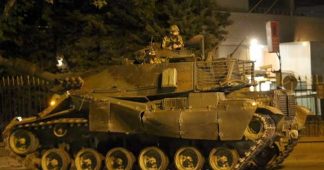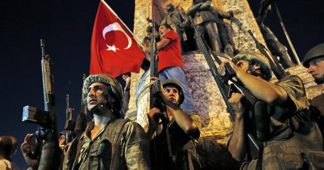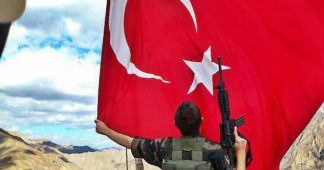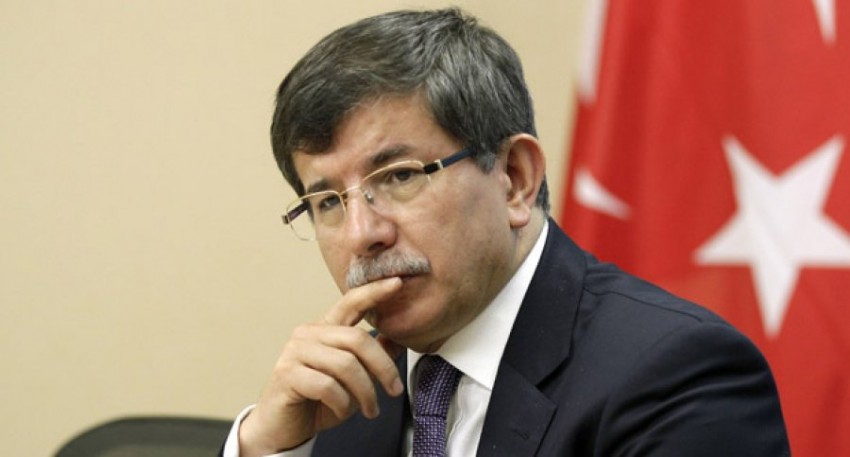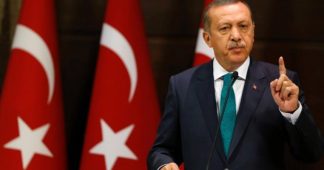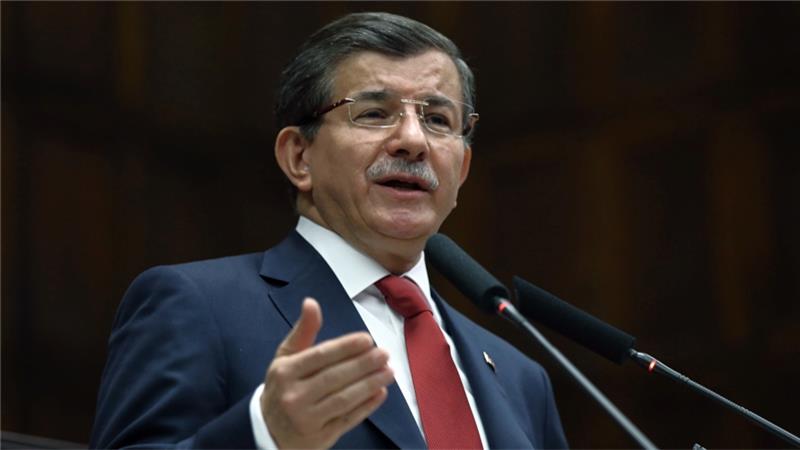Published in www.al-monitor.com
American [author and former CIA officer] Graham Fuller emphasized that the West, including the United States, has now accepted that the [Bashar al-] Assad government will retain power. According to Fuller, Turkey has to do the same. Fuller, who described the Islamic State of Iraq and al-Sham [now the Islamic State, or IS] as “made in the USA,” also made a confession of sorts about the struggle between [Turkey’s Justice and Development Party] AKP and the Gulen movement by saying, “It turned out to be deeper than I thought.” But he noted that the positive approach of the Unite toward [Fethullah] Gulen has not changed.
Why?
Fuller is one of the top American experts on Turkey, the Middle East and the Kurdish issue. As he was a former CIA official, there has been much speculation about him. He was one of the people who endorsed American approval of Fethullah Gulen’s residence in the United States. This is how he also came to be called a Gulenist in addition to his other labels of agent and manipulator. This is why he resents the Turkish media and stays away from it. I had to work hard to get him to agree to an interview. He rejected me several times, saying, “I have been out of the CIA for 30 years and they still talk about that. My relationship with Turkey is longer and more deeply rooted than my relationship with the CIA.” In the end he agreed. Fuller (whose book “Turkey and the Arab Spring: Leadership in the Middle East” was published [four] months ago) and I discussed Syria policy, IS, the Kurdish issue and solution process and the AKP-Gulen war.
Radikal: If we could go back three years, what would have been the right way for Turkey to formulate its Syria policy?
Fuller: Turkey fell into a trap the entire world falls into. It miscalculated Assad’s capacity to remain in power. For me, Turkey’s foreign policy that supported the opposition forces which wanted change in Tunisia, Egypt, Yemen and Libya was entirely correct. But [then-Foreign Minister Ahmet] Davutoglu and [then-Prime Minister Recep Tayyip] Erdogan thought that same process could be replicated in Syria. It didn’t work out that way. That made them focus more on Syria and resort to [applying] heavy pressure to topple Assad. Let alone being successful, this pressure made the issue even more complex. As a result, Assad didn’t leave and Turkey’s relations with Iraq and Iran deteriorated. If you ask me, Turkey should revert to the successful principles of Gul-Davutoglu-Erdogan foreign policy [former President Abdullah Gul]. What were those principles? Talking to all the parties in the Middle East, criticizing Israel’s right-wing policies, operating independently from the bankrupt policies of the United States, staying away from sectarianism and openly advising Islamist governments on importance of secularism.
Radikal: Wasn’t there an option of staying neutral instead of supporting the Syrian opposition?
Fuller: It is easy to say in hindsight. But in those days all intelligence services were predicting that Assad couldn’t last long and he would be toppled with a slight push. First they nudged him and then pushed him hard. What happened? Attempts to kick out Assad brought us the grand jihadists. This is when the situation changed drastically. It was then universally recognized that to topple Assad by force would be to the detriment of all. The view that Assad is not a good choice but his successor would be worse prevailed.
Radikal: How did all intelligence services fail to understand Assad’s power?
Fuller: A good question, but [there is] no complete answer. As it was the case with [former Egyptian President Hosni] Mubarak and [former Libyan leader Col. Moammar] Gadhafi, Assad did not face a unified opposition. It is important to know that Assad is not a sectarian leader. Although he is a Nusayri, he favors Sunnis. He is more of an Arab nationalist than all [other] Arab leaders. He supported Palestinians for years. He did not allow Islamists in Syria to gain strength. Christians and other minorities, and even Israel, didn’t like Assad, but they found him much more acceptable than a possible Islamist Sunni government. For Israel, Assad is a predictable foe. If you make a deal with him, he will keep his word even if reaching an agreement with him is never easy. This is why many countries, including the United States, have given up supporting the Syrian opposition. Washington, even if unwillingly, has accepted that Assad will remain in power for now.
Radikal: When you say “accepted” …
Fuller: I wanted to say that Washington has decided that Assad staying in power serves US interests. Turkey has no choice but to do the same. I fully approved of Turkish foreign policy until the crisis in Syria. The road taken in Syria might not have given the desired results, but that doesn’t mean that Turkey’s strategic thinking was wrong. Now Turkey has to wisely restructure this policy anew. I am sorry to say, but Turkey has to accept Assad and devise ways to work with Assad’s Syria.
Radikal: But how to reach an understanding with Assad after all this?
Fuller: I know. It is not easy. But the United States has decided to do so. Turkey, too, has to adopt a position of consenting to Assad’s continuing rule of Syria. The Syria policy of Turkey [and the United States] is prohibitively costly. It damages Turkey’s position in the region and its ties with Iran and Iraq.
Radikal: How do you think ISIS [IS] was born?
Fuller: I think the United States is one of the key creators of this organization. The United States did not plan the formation of ISIS, but its destructive interventions in the Middle East and the war in Iraq were the basic causes of the birth of ISIS. You will remember that that the starting point of this organization was to protest the US invasion of Iraq. In those days it was supported by many non-Islamist Sunnis as well because of their opposition to the Iraq’s occupation. I think even today ISIS [now the Islamic State] is supported by many Sunnis who feel isolated by the Shiite government in Baghdad. ISIS was benefiting from the Shiite agenda of the [former Prime Minister Nouri al-] Maliki government. I hope with the departure of Maliki and his replacement by someone who will watch out for Sunni-Shiite balance, polarization in Iraq will diminish. This is the only way to get rid of ISIS, never militarily.
Radikal: Very rapid movements of ISIS and the dismal state of our borders lead to questions of whether our towns will be targeted by ISIS. Should we panic?
Fuller: I don’t think so. First of all, Turkey is not an ISIS target because it supported the Syrian opposition. I am sure ISIS is not delighted with Turkey, but you are not its primary target. Their priority targets are Arabs. Moreover, Erdogan, whether he is liked or not, is a product of democracy. Arab geography is full of incompetent dictators who are vulnerable to exploitation by ISIS. ISIS sees opportunities to make headway in Jordan, Syria, Saudi Arabia and perhaps in some Gulf countries. Of course nobody can assure you that ISIS will not launch terror operations in other countries, but the Islamist support it can count on in Turkey is extremely limited. At the moment it will not want to push its luck by entering into such places.
Radikal: But they are still holding about 40 of our diplomats and personnel. They are holding them as aces in their hands …
Fuller: True. You have to pursue a careful policy on this. Our Iran embassy was also taken hostage in Iran in the 1970s. We had tough times, although we were dealing with a minor state. I don’t know the status of negotiations between Turkey and ISIS. But I can say that as long as there are negotiations, there is hope. I don’t want to make any other comment on what kind of tactical policy Turkey should adopt.
Radikal: Is the PKK’s [Kurdistan Workers Party] fighting with ISIS affecting Western perceptions of the Kurdish group?
Fuller: The PKK sees ISIS as a threat to all the Kurds of the region and is aware of the possibility of Erbil being captured by ISIS. This is why it is fighting them. I am not at all surprised by the PKK attitude. It is interpreted as an expected move both in the West and many segments in Turkey.
Radikal: Parallel to all these developments, negotiations are continuing between the Turkish state and the Kurdish movement for a solution. How do you assess the point they have reached?
Fuller: I pay a lot of attention to it. Finally Turkish public opinion got used to the idea that “You make peace with your enemy, not with your friend. If you want peace you have to sit down with your enemy.” This is why your public doesn’t react to talk with the PKK leaders and Kandil headquarters that were once seen as the worst devils. This is not something new that happened overnight. You got here slowly. This process began in the ’90s with the realization that Kurds are different people. Good commercial and political relations with the Kurdish administration in northern Iraq influenced the changing of perceptions in Turkey. These were major and forceful motivators of the peace negotiations. When I look at the map of the Middle East today, I see a high probability of these talks ending for the benefit of both sides. Kurds and Turks, as close allies, could well come out as the winners from this imbroglio. Both parties are not dreaming and they see the reality. Look, for Turkey the worst danger is an “unhappy Diyarbakir [major southeastern city heavily populated by Kurds].” An “unhappy Diyarbakir” can easily be exploited by Turkey’s enemies. A “happy Diyarbakir” is a threat to Syria, Iran and Iraq. Turkey is managing the Kurdish issue much more successfully than these countries.
Radikal: What will be the concrete steps taken at the end of the solution process?
Fuller: I think the Kurdish side will gain some sort of administrative and cultural autonomy. This is the minimum goal. Most Turks actually support decentralization, not only for Kurdish cities but for all of Turkey. This autonomy I am talking about will be a part of a larger decentralization. Apart from that, it is not easy for me to predict where the negotiations will go. Many people ask me if there will be an independent Kurdistan at the end. I don’t know. But I think if Turkey manages the situation wisely, there will be no possibility of independence. Independence will be possible if the Kurdish issue is not managed correctly.
Radikal: Is it being managed smartly and correctly now?
Fuller: Yes. I see great progress as compared to 15 years ago on the Turkish side. It is obvious that the society in Turkey has reached a mature understanding of the Kurdish issue. If the solution process continues along these lines, Turkey will become the most important country for Kurds all over the world.
Radikal: How do you think Kandil headquarters will reformulate the PKK in case of disarmament?
Fuller: I don’t know what the PKK will become, but the most likely step would be to become a powerful political party of Kurdistan after disarming.
Radikal: In an interview with the BBC a few months ago, you said you didn’t think the AKP-Gulen struggle was a deep issue. Have you changed your mind since then?
Fuller: Yes. I was wrong on the AKP-Gulen Movement struggle. It was much deeper than what I thought. This is unfortunate because it is forcing Turkey to take irrelevant ideological positions. I don’t know how this fight will end but I think that a major part of the AKP constituency is not happy with the witch hunt against the Gulen Movement.
Radikal: Erdogan and many AKP people claim that Gulen has set up a parallel hierarchical body in the judiciary and police and that they listen in to many politicians, bureaucrats and journalists. Do you think the Gulen Movement has such capacity?
Fuller: Such a wide-tapping network is usually available only with the police. Anyone who knows Turkey knows that the police have been tapping politicians for years. At times their recordings leak out; sometimes they are used for blackmail. There is nothing new today.
Radikal: But AKP people say the tapping is done by another body now, a body led by Gulen.
Fuller: Some AKP people say so …
Radikal: OK, let’s accept that.
Fuller: Many people accept that the Gulen Movement [Fuller uses the original label of the Gulen Movement, Hizmet, which means Service in English] has influence in the police. This is a new feature of Hizmet.
Radikal: How new a feature?
Fuller: I don’t think Hizmet had such influence over the police before the AKP government. But I want to point out that we should not forget that the police and judiciary are such massive organizations that they cannot be controlled by a single ideology. Therefore the influence of the police in Hizmet may not be as much as claimed. But it is still possible to say that Hizmet now has more power than 15 years ago because of the police connection. When you remember how much the police were marginalized under Kemalist tutelage, you may say that they went too far in their investigations of the Ergenekon [military coup] case. These kinds of abuse of power should be found out and revealed. For me, the Ergenekon case exposed sinister deep state connections and thanks to that the army withdrew from the political arena. This was a key prerequisite for EU membership.
Radikal: Does the AKP-Gulen fight tell us anything about political Islam?
Fuller: Not fully, because Hizmet does not have a concrete presence in the political arena. It doesn’t enter elections; it has no political party structure. This fight can hurt Turkey in the short term but may actually be useful in the long term. Two religious tendencies giving divergent views on politics and governing will provide valuable references for the political Islam currents in the world just as leftists and liberals clash with their opinions. Different religious trends should do the same.
Radikal: But instead of a proper debate when opinions clash, we are observing a clash below the belt. Are you aware of this?
Fuller: Yes I am and it is not a pleasant view. In Turkey all politics are personal. That is why I wasn’t surprised when fighting went below the belt and became personalized no matter how distasteful. This is what I meant by damaging Turkey in the short term. Erdogan’s attitude, which appears to hinder the corruption investigations of his ministers, is dragging the country in a dangerous direction.
Radikal: Is there a change in the US attitude toward Gulen, who lives in Pennsylvania? Will there be a change?
Fuller: In principle, the United States doesn’t like any Islamic organization. But in the real world, you may have to make choice between those you don’t like. In such a situation the Gulen movement is preferable for the United States. We can say that the United States has a relatively positive look.
Radikal: Is that positive US approach still valid?
Fuller: Definitely. As far as I know, the attitude toward Gulen has not changed.
Radikal: Erdogan used to say that he had frequently talked to Washington about Gulen and that he wanted his extradition…
Fuller: Anyone who knows Turkey knows that it is absurd to label the Gulen Movement as a terrorist organization. And anyone who knows the United States a bit knows that when there is no solid evidence of a crime, the United States will not extradite anyone just because another country wants it so. We all see that this is a political fight about Turkey’s domestic politics. The United States will not be party to such a fight. But should the principles of the separation of powers be violated and the intimidation of the press continue, you have to understand that Washington will be seriously upset.
